News & Events in Belarus
Prospects in Moscow Oblast, proper land amelioration, price control strategy in President’s Week
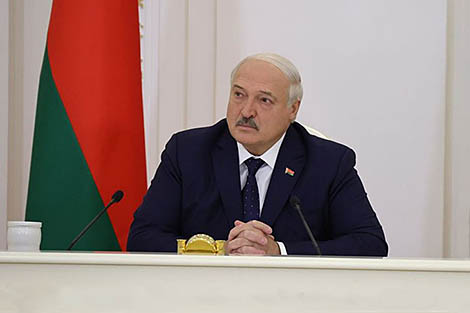
The work schedule of the Belarus president is always full of events. Aleksandr Lukashenko holds conferences and working meetings on the most topical matters concerning the country’s development, regularly visits the regions, goes on foreign trips and welcomes foreign guests, talks to reporters, signs decrees and laws. And even if there are no public events, it does not mean that the head of state does not work. It must be said that even when he relaxes, for instance, by playing ice hockey or chopping firewood, Aleksandr Lukashenko happens to find the time to give yet another instruction. All the decisions must be prompted by life, he likes to say.
The President’s Week project is intended for those, who want to keep up with the head of state, be up-to-date on the latest statements and decisions of the Belarusian leader.
What record highs does Belarus achieve in cooperation with Moscow Oblast? What was discussed during the first visit of the Moscow Oblast governor to Minsk?
How will the work of the Belarusian National Biotechnological Corporation improve? Why is Aleksandr Lukashenko displeased with the land amelioration situation? Obvious inconsistencies, timeserver executives, and strict instructions of the president.
Why does Belarus still hold the door open to residents of Baltic states and Poland? Details of another extension of the visa-free travel program.
Did the government manage to keep prices under control and keep the consumer market satisfied? Why did Aleksandr Lukashenko praise the government? How will prices be regulated as from 1 January?
All of it and more than that is covered by the latest episode of BelTA’s special project President’s Week.
FULL OF PROMISE. Opportunities for stepping up cooperation with Moscow Oblast
Nobody gets surprised by regular visits of heads of various regions of the Russian Federation to Belarus. Aleksandr Lukashenko receives delegations led by Russian governors in the Palace of Independence virtually every week. He has repeatedly said that this kind of regional cooperation saved Belarusian-Russian relations as a whole back in the day.
Governor of Russia’s Moscow Oblast Andrei Vorobyov came to Minsk this time. It is worth noting that it was his first visit to Belarus as an oblast governor after more than 10 years of holding this office. But the key thing is that it has not affected the scale of cooperation. The governor remarked upon very tight contacts with Belarusian officials and executives of various levels and the active work of the ambassador in Moscow. Largely thanks to this Belarus and China are the two main partners of Moscow Oblast. This year’s bilateral trade is expected to exceed $10 billion. It will be the highest figure in the entire history of cooperation.
Moscow Oblast is a strategic partner for Belarus, the head of state emphasized. It ranks first among Russian regions in terms of trade with Belarus. “We are talking about colossal volumes of our foreign economic trade,” the president remarked. In January-October 2023 the trade increased by almost a quarter to exceed $9 billion. “This is a significant achievement given the high base and a substantial growth [of about 25%] last year,” the Belarusian leader remarked.
Belarus and Moscow Oblast trade in nearly everything they produce. The main products are household appliances, foodstuffs (butter, cheese), metal products, medications, equipment, spare parts, and many more. “Such a level of trade turnover owes a lot to the favorable location of Moscow Oblast, which makes the region kind of a logistics hub and a central point for consequent deliveries to other Russian regions,” the president said.
It is a good foundation but Aleksandr Lukashenko suggested taking a look into the future. “Dealership and trade are good. But they are too dependent on the current state of the market,” the president said. “The task of any leader is to ensure employment and wellbeing for people. To this end, we need a serious foundation in the form of manufacturing our own products with a high added value at joint ventures.”
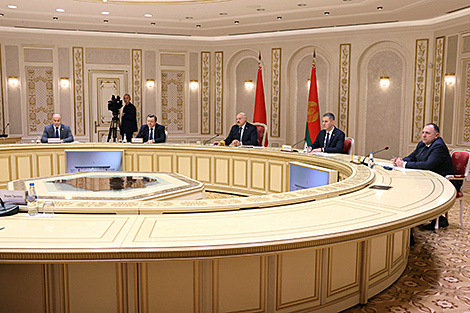
The president mentioned a number of concrete areas where prospects for advancing and stepping up cooperation are available. Those include road construction and housing and utilities industry. This sphere is very actively developing in Moscow Oblast and Belarus is ready to help with machines, vehicles, equipment, and more than that.
Belarus’ second proposal outlined by the head of state is related to concrete production: “I know that there are plans to set up the production of dry building mixes based on Belarusian cement in your region. I propose to add the production of concrete.” The Belarusian Architecture and Construction Ministry is ready to work out logistics and possible locations of concrete mixing facilities together with Moscow Oblast.
The third area is maintenance, supply of spare parts, warranty, and financial instruments. “We have a lot of experience in these areas in Russia. But with the help of your region we would like to secure a firm foothold by creating a large-scale service and logistics hub for this part of the Russian Federation,” the Belarusian leader explained.
Medical services and rehabilitation are the next area of mutual interest for the two parties, the president said. “You have shown interest in this area. You can count on us,” the Belarusian leader told participants of the meeting. But it is necessary to take steps to prevent the cost of components of medical equipment and the cost of services from being too expensive for ordinary people. The thing is the cost of certification of medical products in Russia is several times higher than, for example, within the framework of the Eurasian Economic Union. Ambassador Extraordinary and Plenipotentiary of Belarus to Russia Dmitry Krutoi was instructed to look into the matter.
The development of manufacturing cooperation ties and new production chains to replace imported products was the fifth area discussed at the meeting. “We have accumulated good experience in this regard. We very often discuss these issues with the president of the Russian Federation. I am pleased to note that we probably work best of all with Moscow Oblast [in terms of import substitution development],” he said.
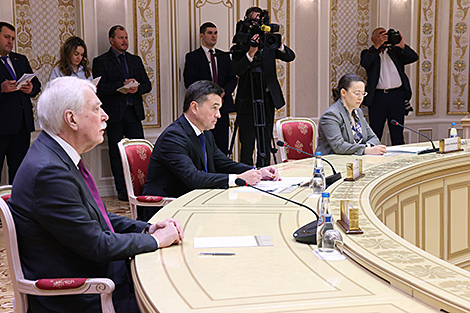
Cooperation in agriculture is also among promising areas of joint activities. It is only necessary to determine the most promising areas.
There is also a significant potential for Belarusian builders to participate in the implementation of housing, social infrastructure and road construction projects. “Our companies are ready to offer not only construction services but also machinery,” the Belarusian leader stressed.
The head of state also mentioned Belarus’ interest in advancing cooperation in science and technology. Especially since Moscow Oblast has one of Russia’s largest scientific and technical complexes. “I think we could develop a plan of scientific and technical cooperation or, as it is fashionable to say, a roadmap for cooperation between our National Academy of Sciences and Moscow Oblast,” the president suggested.
The head of state mentioned the development of cultural and humanitarian ties, work with the youth. At its core it is as important as trade and economic cooperation.
In conclusion the head of state emphasized Belarus’ readiness for an open substantive dialogue on all the outlined matters: “I would like to assure you that if we agree on some matters, we will neither slow down nor deviate from these agreements.”
IMAGE-BUILDING PROJECT. What is wrong with the Belarusian National Biotechnology Corporation?
One of the two key matters discussed during the government conference hosted by the president on 19 December was the operation of the Belarusian National Biotechnology Corporation (BNBC). The second key matter was land amelioration. We will talk about it in detail later on. Taking part in the meeting were members of the government, heads of government agencies, oblast governors, and representatives of the scientific community. This composition traditionally looks into the most pressing matters of importance for the strategic development of the state.
Speaking about the first item on the agenda, Aleksandr Lukashenko reminded that it had been a year since the unique large-scale manufacturing facility was solemnly launched at the BNBC. “Back then and even now we are proud of this manufacturing facility. All the conditions were created to launch it. And we agreed that we would support the project in every possible way,” he remarked.
At the same time, according to the head of state, the state of affairs at the enterprise is not exactly as planned: “The State Control Committee that was instructed to carefully examine the situation at the BNBC reports that there are significant shortcomings and problems with the utilization of the facility’s capacity and with the sale of finished products. All this negatively affects the financial performance of the BNBC. Of course it does!”
The president told the government to put forward a clear algorithm for eliminating all existing shortcomings and maintaining financial stability at the enterprise. He was primarily interested in progress in implementing production plans and the export strategy, in whether additional decisions are necessary for the sake of balanced development of the corporation.
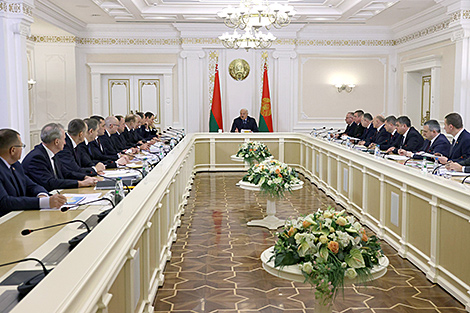
“I want you to understand that it is an image-building project. It is a very important technological project for our country. You know how much it cost not only me, but also the state,” the Belarusian leader said.
As a result, it was decided to enhance the corporation’s management with a representative of the state, who will be in charge of overseeing the operation of the enterprise. In other words, the government’s representative will be in charge of the strategy while the corporation’s CEO will take care of tactics.
NO WINDOW DRESSING. How did a land reclamation report surprise Aleksandr Lukashenko?
Clear tasks were set at a nationwide seminar-conference on land reclamation and the use of reclaimed lands a year ago. However, the situation with the fulfillment of land reclamation measures is far from ideal in several oblasts. Aleksandr Lukashenko hosted a conference in the Palace of Independence on 19 December to discuss shortcomings in this sphere.
“We have agreed on the need to triple the volume of land reclamation activities from 2023 to 2025 in comparison with 2021. Deputy Prime Minister Leonid Zayats reports to me that the volume of the work has been tripled this year. Is it true?” the president said.
Leonid Zayats confirmed the information.
“You’ve tripled it. But what surprises me is that judging from your reports everything is broken down, only one out of 100 trenchers is operational. There is an urgent need to save land reclamation as an industry. How did you manage to triple the amount of land reclamation work this year? Did you dig these trenches with shovels? Or do you want to substitute the wish for the reality? It will not work,” Aleksandr Lukashenko emphasized.
The head of state said that he was alarmed by the work of the government in some areas. Individual principal instructions of the president remain unfulfilled. “Is this becoming kind of a habit for the government? This is unacceptable. It will not fly past me,” he warned.
Double speak
Aleksandr Lukashenko stressed that oblast governors pledged to put 110,000 hectares of land into agricultural use in 2023. The necessary decisions at the level of the head of state on financing land reclamation work and the purchase of equipment were made in the middle of the year.
But the situation with the fulfillment of the plans is far from ideal. To fix it, the government and oblast administrations are initiating changes in the structure of the ongoing works to concentrate resources on land clearance operations. According to Aleksandr Lukashenko, while land clearance and land reclamation are similar things, they are still different. Land clearance operations simply mean tidying up agricultural lands. For example, by cutting down bushes. The president expressed bewilderment at how land reclamation could be substituted for this type of work.
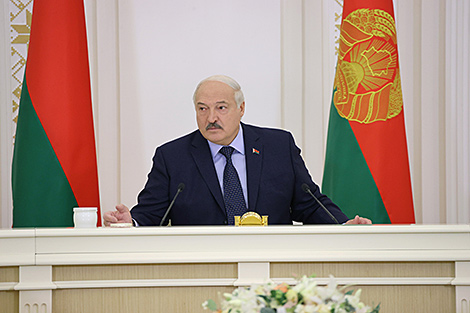
“You have failed to dig trenches and lay drains, save agricultural lands in a serious manner, and now you are putting forward an initiative to turn all this into land clearance operations. Tomorrow you will propose to transfer the money allocated for land reclamation to cutting shrubs. Here is my decision: Roman Aleksandrovich [Golovchenko, Prime Minister], you will cut down bushes with axes and spades. Land clearance should be done by agricultural enterprises. We will carry out land reclamation as we should according to science,” the head of state said.
He remarked that it is the duty of the owner (reclamation system enterprises and agricultural enterprises) to keep reclamation canals clean and in order, maintain them in a timely manner so that every piece of land was used for agriculture.
The president said that he was amazed by the attitude of responsible officials to these matters because in order to increase the export of agricultural products, Belarus badly needs additional land, which can be gained thanks to land reclamation. “We have at least half a million hectares (even more) standing idle, the ones we have earmarked for land reclamation. We need to save what can and should be saved today,” he remarked.
Equipment and design documents
The Council of Ministers complained about the high degree of deterioration of the trenchers and the lack of project documentation for the entire area where land reclamation systems need to be reconstructed.
Aleksandr Lukashenko presented a clear argument in response: “Is it a problem to take the old documentation? I am not pushing you to develop new reclamation systems. We need to restore the ones that were developed in Soviet times. That is it. There is no need to go deep into forests and swamps! Restore these half a million hectares, and then we will decide what to do next.”
According to the government, there are 101 trenchers in the country, and 99 of them are past their service life.
“Tell me honestly: did you sign the paper they gave you or did you count them yourself?” the president asked the prime minister.
“Of course, we did not check every one of them,” Roman Golovchenko replied.
“Then do not sign what you have not checked. Call them up and ask them how it is possible to triple the work with 100 broken [trenchers]. It is the obvious thing to do,” the head of state said.
Aleksandr Lukashenko reminded that he had repeatedly given instructions to restore agricultural machinery. As practice shows, it is two to three times cheaper to repair equipment than to buy new one. When it comes to hundreds of thousands of U.S. dollars, the savings are substantial.
“Everything must be restored and put in operation!" the president demanded. “A year ago I instructed to inventory land reclamation equipment, take all necessary measures to restore, repair and preserve it. When will you give me results?”
“If all these registered trenchers do not start working in April, everyone will go to prison. I warn you in public,” the head of state instructed the chairman of the State Control Committee.
The head of state also had questions about deliveries of new machines and equipment. In January 2023 the president was briefed that upon requests from land reclamation organizations a plan to produce special-purpose Amkodor equipment and establish service centers for its warranty maintenance was approved. “Where is it?” Aleksandr Lukashenko asked. “You came to me crying and asked me to help Amkodor, allocate money. Where do we allocate money? There is too much talk and too little action!”
According to the information available to the head of state, as of 12 December only 64 trenchers were shipped to customers or one third of the total amount of the 188 trenchers Amkodor was supposed to deliver in 2023. Only one out of 14 multi-bucket trenchers from the same plan has been delivered.
Land amelioration situation and timeserver officials
The president asked the prime minister about his vision of the state of affairs in land reclamation. The head of state added that he often gets familiar with the pace of work on the ground from his helicopter. According to Aleksandr Lukashenko, everything has been put in order around his small homeland, in Shklov District, but there are still many problems in other regions.
“I have already warned you. It kills me that you are engaged in window dressing. I fly all over the country and see where you work and where you don’t. This is where the need for land reclamation came from, this is where I realized that these lands must be saved. We need to save them and make a foundation for our children to understand how to work further,” the Belarusian leader said. “But you work as if you were timeservers.”
Roman Golovchenko stated that he had a heavy impression of the situation in the sector. In his words, for the past ten years land reclamation has not been given due attention, and as a result the Agriculture and Food Ministry department in charge of these matters was disbanded, and the regional land reclamation organizations were left free to chart their own course. Now the government is in the process of restoring this entire system.
“The first thing we faced was the need to strengthen the physical infrastructure of the organizations. Things were totally broken in some of them. There was no work and respectively the workers left,” the head of government said.
“Who was held responsible for this?” the president asked.
According to the prime minister, about 100 officials faced disciplinary action, ten people were dismissed for discreditable circumstances, and 13 criminal cases were opened.
“You said that you punished them by firing them. But they have already found jobs in the private sector, they earn three times as much and laugh at you. Isn’t it possible?” Aleksandr Lukashenko asked.
“It is,” Roman Golovchenko agreed.
“This is the style of your work. We make a decision here and what happens there? This is called ‘temporary workers’,” the president said.
Aleksandr Lukashenko was also interested in the opinion of the State Control Committee. According to the committee’s Chairman Vasily Gerasimov, falsification of figures remain the main problem, and this problem is observed in every oblast. “The worst thing is (you have talked about it and the relevant criminal cases were opened) that land reclamation works were conducted in some places but everything overgrew there with time. In other words, we simply buried our investment. Both we and the prosecutor’s office are taking the toughest measures here,” the chairman of the State Control Committee said.
IN A NEIGHBORLY FASHION. How did the president respond to requests of foreigners and the proposal of the Ministry of Foreign Affairs?
On 20 December Aleksandr Lukashenko backed the proposal of the Council of Ministers and the Ministry of Foreign Affairs to extend the visa waiver program for citizens of Lithuania, Latvia, and Poland onto 2024.
Belarus waived visas for citizens of Lithuania and Latvia, non-citizens of Latvia as from 15 April 2022 and for citizens of Poland as from 1 July 2022. In December 2022 the visa waiver program was extended onto 2023.
The visa waiver program in 2022-2023 showed a steady interest of residents of the neighboring states in visiting the Republic of Belarus despite the obstacles and restrictions created by the governments of Lithuania, Latvia, and Poland.
The visa waiver program shows that the Republic of Belarus is open to the idea of restoring normal equal interaction with the neighboring states. It also helps maintain ties with the Belarusian national minorities and overcome the information blockade put up by political elites of the neighboring countries through interpersonal communications.
Head of the Central Consular Office of the Belarusian Ministry of Foreign Affairs Andrei Kozhan told reporters that nearly 800,000 citizens of Lithuania, Latvia, and Poland have visited Belarus since the launch of the visa waiver program. “This year alone we have welcomed around 405,000 residents of the neighboring countries as part of the visa waiver program. Despite all the obstacles that exist at the border such as closed border crossings [by Belarus' western neighbors] and artificially slowed down border queues. The interest has been strong and remains so,” he said.
Since September Belarusian authorities have been receiving requests from diasporas and ordinary citizens living in the neighboring countries to extend the visa waiver program. “We did not leave such letters and appeals unnoticed and put together our appeal on behalf of the Ministry of Foreign Affairs to the head of state with a request to extend this remarkable endeavor onto 2024. Our initiative was supported,” the official said.
A MATTER OF JUSTICE. Has the government managed to tame prices in Belarus?
On 21 December Aleksandr Lukashenko hosted a government conference to discuss ways to improve the price regulation and oversight system. It was a scheduled event. The president had previously stated the intention to discuss the state of affairs in this matter in detail.
The president emphasized that when the government was instructed to deal with the matter more than a year ago, freezing or even restraining prices was not the idea. “Regulating the pricing practices was the idea. Some prices were restrained. Some prices went up. You cannot fool the economy,” the Belarusian leader said. “We understand perfectly well that if we freeze the prices that we shouldn’t freeze, then tomorrow the goods will disappear. No one will work at a loss. We proceeded from that.”
At the beginning of the conference Aleksandr Lukashenko stipulated the key guideline right away: “I want you to understand that you will not kick this matter into the long grass. This is a moral, political, strategic matter. Whatever you may call it. But most importantly it is a matter of social justice.”
Aleksandr Lukashenko explained that it would be fine if higher prices contributed to salaries of milkmaids. But the profits were pocketed not even by retail workers but by some business owners, who earned at least $35,000 a month.
“Nevertheless, we have succeeded to put things in order to some extent. This is a matter of justice. Demand for justice has always been high among the Slavic nations, including in Belarus. We cannot leave this matter behind. This is the number one matter for our people. There is no populism here. No populism prompted by the election campaign. We have always kept the matter on the radar. Since it had not been resolved, a tough decision was made,” Aleksandr Lukashenko said.
It was necessary to look at how this process is developing at a regular government conference on prices and pricing.
A clear and understandable system as from 1 January
“There is one goal. I have warned the government about it. No manufacturers, businessmen, traders and the others, who provide services, should run to the Ministry of Antimonopoly Regulation and Trade (MART), to other ministries or to the government in order to negotiate prices. Starting from 1 January, we should have a clear, intelligible system of price regulation,” the Belarusian leader said. The president instructed the government to revisit this issue and stressed that the Ministry of Antimonopoly Regulation and Trade should not be engaged in coordinating prices. “Listen, how many people will MART have to employ to monitor and coordinate all these matters? I want the government to revisit the issue, set the tasks for everyone. From auditors, MPs to the prime minister. Feel free to seek my help if necessary. But the thing must be sorted out,” he demanded.
After the government conference First Deputy Prime Minister of Belarus Nikolai Snopkov told reporters that the system will start working as from 1 January. It was truly difficult to implement it a year ago even from the point of view of the methods. “But the initial requirement was for us to have a system in place. Economic laws cannot be ignored out of fear of consequences,” the official said. “This is why a system will be built that will involve the need to get prices approved by anyone else as little as possible. A percentage threshold will be established. Within this limit any enterprise will be free to set prices for the home consumer market. It will not affect intermediate goods, investment goods. And it will definitely not apply to exports. You can export goods at any price you like and use the price to compensate for profits lost on the home market. As a matter of principle, we are ready for such a system and it will be realized as from 1 January as the president instructed.”
Nikolai Snopkov emphasized that profits lost on the home market are not entirely the right term: “The domestic market is sacred. Earnings of Belarus citizens and citizens of the countries that buy our products vary. There are all kinds of social burdens. Keeping the domestic market well supplied is simply a sacred duty.”
Asked whether restrictions on price markups for retail chains will remain in place, Nikolai Snopkov said: “Of course. There is no other option. Experience and practice of 2023 indicate that we’ve struck a balance between fair pricing for retail chains and keeping the retail chains in the black.”
Efforts to reduce inflation
The head of state stated that this year the inflation in Belarus has significantly decreased, including thanks to the measures to regulate pricing. Skeptics argued that such measures could push a number of players out from the market. But the situation is absolutely normal. “The inflation hovers at around 5-6%. We projected 6% or under 7%. At some point it was running as high as 19%. Everyone argued against these measures saying that companies would leave and that there would be no traders left. But we do have those who are busy trading. If some do not like it in Belarus, the door is open, both ways,” the Belarusian leader summed up.
The president stated that initial fears of certain individuals regarding the introduction of state-regulated price controls had not been proven correct and economic indicators prove it. “Nothing happened. We work as usual,” the head of state stressed.
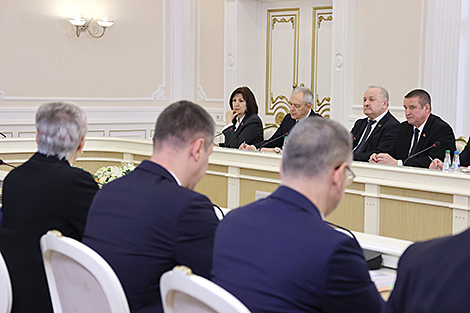
First Deputy Prime Minister Nikolai Snopkov said that as of 1 December the annual inflation stood at 5.4%. This is almost three times lower than the increase in the consumer price index in October 2022. At the time the president gave instructions to ensure a reasonable level of prices and made appropriate decisions at the state level. “I emphasize it was not about freezing, but ensuring a reasonable level of prices,” Nikolai Snopkov said.
The first deputy prime minister attributed the inflation increase to three main factors. The first one was the decisions by government agencies on sectoral price regulation, which accounted for 2.1 percentage points of the overall inflation rate. For instance, prices and tariffs were increased for excisable goods (tobacco, alcohol), housing and utility services, passenger rail transport, higher education and preschool education services.
The second factor was the increase in prices for imported goods, mainly from third countries, against the background of exchange rate fluctuations. They contributed 1.5% to the inflation. “This is imported inflation,” Nikolai Snopkov explained.
The third factor influencing the inflation in the country was the decisions made by government agencies to raise prices within the framework of resolution No.713 of 19 October 2022. A total of 763 decisions were made to raise prices and 1,350 decisions were made to set prices for new goods. This contributed about 1% to the inflation. Milk, meat, and clothing increased in price the most. On the other hand, prices for cereals, pasta, synthetic detergents decreased (by about 5%). The increase in prices for most goods has been moderate recently. It is mainly attributed to a seasonal increase in prices for vegetables and imported fruits. On the whole, the annual inflation is projected at 5.4-5.6% in 2023.
The situation on the consumer market
During the conference Nikolai Snopkov stated that in January-November 2023 retail trade turnover rose by 8.2% in comparison with the same period of last year. “In other words, people shop more often and buy more now. It is the key result,” the head of state noted after hearing these figures.
Meanwhile, profits of Belarusian retailers dropped to no surprise of the government. The decrease in profits was expected and predicted. “It could not have been otherwise because we controlled price markups,” Nikolai Snopkov explained.
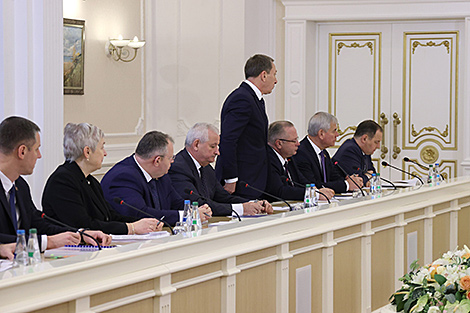
At the same time the official pointed out that only 137 organizations out of the 714 trade organizations covered by the National Statistics Committee turned out to be unprofitable in January-October 2023, including 105 organizations, which reported losses due to current operations. “Most of the trade organizations demonstrate financial stability. Despite the fact that we’ve reduced price markups,” the first deputy prime minister stressed. “Price regulations have reduced profits but allow normal operation.”
Nikolai Snopkov also drew attention to the fact that prices for most goods in Belarus have been lower than those in Russia for years already. “This is certainly a risk factor,” the president said. “People should understand that if we keep prices even lower and if prices go up in Russia, then commodities will flow there. We've been through such situations before.”
“Yes, they will leave our market immediately,” Nikolai Snopkov agreed. “That’s why we’re trying to balance things.”
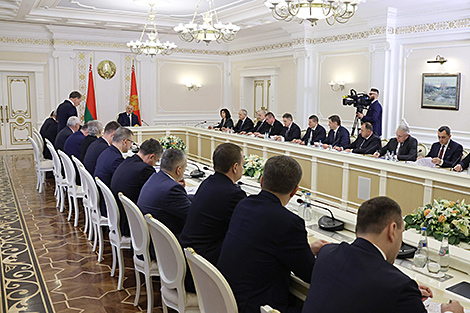
“The consumer market is stable. The choice of goods is maintained. There are no reasons to expect a shortage of any goods,” the first deputy prime minister stressed.
In response the president warned against self-complacency. Nikolai Snopkov assured that he keeps an eye on the situation on a daily basis.
Unnecessary intermediaries on the medication market
It has already been noted that imported inflation is one of the factors that contribute to rising prices in Belarus. For example, imported medicines and fruits have risen in price by almost 12%, international passenger rail transportation - by 23%, tourist services - by 22%. Nevertheless, the president demanded to look into whether the increase in prices for fruits and especially for medicines had been justified. “What are we afraid of? That some private pharmacies will leave the market? Let them go! We have enough state-owned pharmacies. In general, the Healthcare Ministry should deal with this,” Aleksandr Lukashenko said.
The head of state once again drew attention to the need to exclude unreasonable mediation to get fair prices for medicines. “I will tell you how the prices for imported medicines are formed, and you will see how many mediators there are: sons, close relatives, and mistresses,” Aleksandr Lukashenko told Nikolai Snopkov. For example, prices for domestic medicines rose by as little as 2.2% since there are no intermediaries.
The problem of cucumbers and what not
Speaking about pricing and inflation, Aleksandr Lukashenko could not ignore the rise in prices for domestic vegetables, in particular, for cucumbers and tomatoes.
Back in spring the head of state gave an instruction to come to grips with issues related to the production of fruits and vegetables in the off-season. In particular, the president suggested building more greenhouses so that Belarusians could be able to buy domestic vegetables all the year round. However, the government decided to try to fulfill this task with the least investment. According to assurances of Deputy Prime Minister Leonid Zayats, the return has been good: there are sufficient domestic products in retail. Cucumber prices dropped by about 16.5% compared with December 2022.
However, Aleksandr Lukashenko drew attention to the seasonal increase in prices for vegetables. He noted that people are concerned about today’s prices, not last year’s. As statistics show, the measures taken were not enough. “You should produce these cucumbers in sufficient quantities. People want them to be cheaper in the run-up to New Year,” the president demanded. “I told you to build 10 more greenhouses. You said that you would install more lighting in greenhouses. So go ahead!”
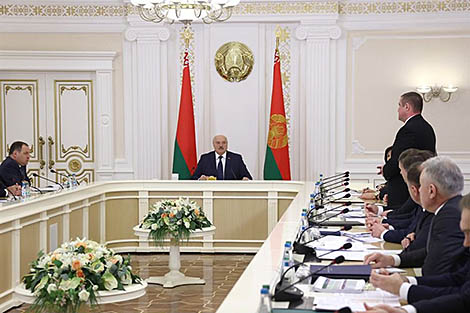
As Chairwoman of the National Statistical Committee Inna Medvedeva reported, in December prices for cucumbers surged by almost 66% in comparison with November. The situation is similar for cabbage, onions, beets, carrots, and tomatoes.
“We’ll provide enough light and cucumbers will grow just like that!” Aleksandr Lukashenko said sarcastically commenting on the government’s promises. “Think about the steps you should take. Why am I asking this question? I would not have said it some 10-15 years ago as gas and oil were expensive back then. But now there’s enough of everything.”
“Of course, there is room for improvement, and we are aware of this problem,” First Deputy Prime Minister Nikolai Snopkov responded.
“We need to put more efforts in it. At least where we can,” the head of state demanded. “Keep in mind, this is our first step to sort out prices. Everything will depend on production, on volumes. We need to ramp up output, especially where we can.”
The economic situation and the rational behavior of Belarusians
Speaking about the measures implemented to regulate prices, the president advised the government to not particularly worry about falling profits of a small number of trade organizations: “As for their profits, you should not worry about profits of trade organizations. Well, they paid slightly less in taxes to the state budget. But it seems to me the budget is doing fine, isn’t it?”
“More than that,” Nikolai Snopkov responded.
“Don’t say ‘More than that’ while talking about it. Well done. Things are good where things are good. Otherwise, our poor fugitive opposition activists will come to their senses, will start crying that they don’t have money while money is here,” Aleksandr Lukashenko said with a bit of humor.
According to Nikolai Snopkov, consumer activity of the population remains high. “It is fuelled by the economic policy of our state, which has allowed increasing real salaries by over 10%. Adjusted for inflation,” the first deputy prime minister pointed out. “The growth of consumer lending increased by 1.5 times. The growth of real estate loans increased by 60%. Net sales of foreign currency by the population totaled $400 million.” As a result, the volume of sales in the country has recovered after a decrease in 2022 and primarily sales of durable goods.
In addition to high consumer activity bank deposits of individuals continue growing. Primarily ruble deposits. They have increased by nearly Br2.7 billion since the beginning of the year (25% up). “We conclude that inflation expectations of the population are low. People trust the government. We see it primarily in the banking system. People trust the monetary management policy the government pursues. Meanwhile, the purchasing power of the population is one of the highest in the last few years,” the first deputy prime minister said.
Nikolai Snopkov remarked that in comparison with 2016 the average nominal salary can buy 60% more pork, 60% more poultry meat, 40% more milk, and 10% more potatoes.
On the whole, he described Belarus economy performance in 2023 as good. He attributed the accomplishment to rather active efforts to raise wages and pensions this year, efforts to stimulate consumer loans and real estate loans.
Nikolai Snopkov also drew attention to the common sense and rational behavior Belarusian citizens have demonstrated on the market this year. “It is related both to consumption and savings. It clearly emphasizes the trust Belarusians have in the current economic policy and their trust in the authorities. And we hope that we will not fail them in the future, too,” the first deputy prime minister said.
Problems with the president’s voice
On the whole, the conference lasted for about three hours and reviewed a lot of things taking into account the presence of oblast governors, members of the government, and top-ranking officials. For instance, the operation of the Belarusian National Union of Consumer Societies was thoroughly examined as well as efforts to supply people in small towns and the countryside with everything they need. Aleksandr Lukashenko heard out reports concerning various topics including agribusiness. Wintering in the animal husbandry industry, availability of forage, loss of cattle. The president constantly keeps an eye on these matters and other ones.
It is worth noting that the head of state hosted the lengthy conference despite noticeable problems with his voice. At the beginning of the meeting Aleksandr Lukashenko remarked that he would have to whisper but the meeting had to proceed because there was no way to reschedule it or postpone it. At the end of the government conference Aleksandr Lukashenko remarked that all the questions concerning the state of his voice should be directed to Grodno Oblast Governor Vladimir Karanik, who is a medic by education.
Reporters approached Vladimir Karanik for clarification. The governor explained that during the previous government conference this week he had given certain recommendations to the head of state as a medic after noticing some problems with Aleksandr Lukashenko’s voice.
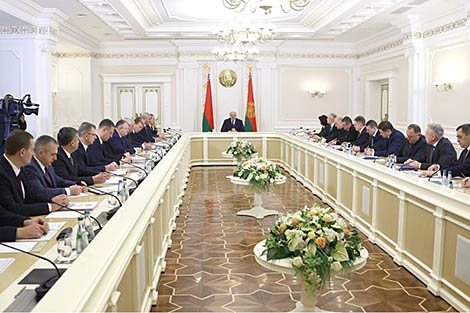
Vladimir Karanik said: “Since today he still had trouble speaking and said that I should answer these questions, I conclude that the recommendations don’t work. Essentially the president is a very inconvenient patient for medics. It is practically impossible to make him follow the therapeutic and protective regimen. Like staying in bed for a couple of days. The main recommendation was given two days ago: don’t stress your voice. But the president didn’t heed it. We can hear the result. A very large amount of conferences, meetings, and flights. A lot of work on his plate. I am surprised he can keep speaking while working so hard.”
“I can say that I evaluate the overall state of the president as very good. Well, his voice will be restored with time,” Vladimir Karanik added.







 print version
print version make home page
make home page add to bookmarks
add to bookmarks

